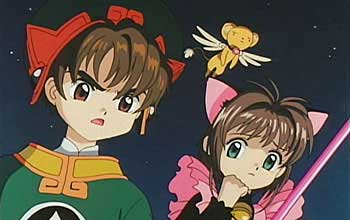
|
"Cardcaptors," on the other hand, is tailored to appeal to a mixed North American youth audience with a penchant for more action and less romance. Here, Li enjoys near equal airtime, Nelvana opting to start the series with the eighth episode of "Card Captor Sakura," which features the introduction of Li. Cosmetic changes include Sakura and Kero's voices being lower and tougher, the elimination of Clamp's stylistic "cutesy" factor wherever possible, and the excision of all Japanese cultural references. It's little wonder fans of the "Card Captor Sakura" series are up in arms over "Cardcaptors." But while many fans of the original loathe the US version, there's no denying the North American version's favorable reviews from critics and audiences unfamiliar with the Japanese original. (Read Lisa Klassen's review of Cardcaptors.)
An issue riding just beneath the surface of the debate is sexism, and the precipitous variations of its definition. Nelvana has developed a reputation for being sensitive to the needs of children's entertainment, choosing shows to develop that are at once entertaining, educational and supportive of the value of friendship and family, traits attributed to Clamp's creation. But some fans felt that Nelvana took this mandate too far. According to an un-credited article at http://belldandy.net/sakura/rants.html Nelvana's official position on its changes to "Card Captor Sakura" were motivated not by commercial concerns but by an impetus to curb sexism.
"Nelvana feels that it is sexist to release a shoujo anime," the article states. "To fix this 'problem' they decided to change parts of the original show." (Another pointed fan article about the sexism argument can be found here.) But press analysis of Nelvana's "Card Captor Sakura" acquisition, and the motivations behind it, is fairly straightforward. "The agreement is the latest example of Nelvana's ongoing strategy to expand its global distribution partners, extend its demographic reach and accelerate growth in the Company's merchandising business through the acquisition of high-profile character brands with strong growth potential," states a 1999 report from the Canadian News Wire. Somewhere between a paladin for the eradication of sexism and a grossly capitalistic entity needling into a lucrative market lays the truth behind Nelvana. Regardless, "Cardcaptors" remains popular and rumors abound about a movie release sometime around Christmas. The "Cardcaptors" debate, though, is symptomatic of a deeper-rooted misunderstanding. Shoujo artists keep producing material not because the want to promote sexism but because it sells. Nelvana has uprooted the characteristically feminine aspects of "Cardcaptors" not because it wants to combat sexism but because it sells. The dichotomy is only skin deep. |
||||||
|
Card Captor Sakura / Cardcaptors © Clamp / Kodansha / NHK / NEP21 / Nelvana.
|


